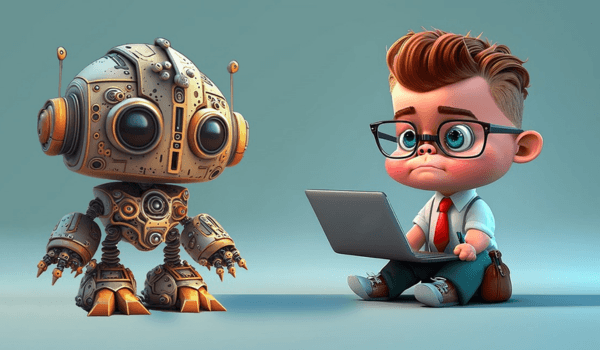AI-based machines or chatbots used in HR are often blamed to be inconsiderate, insensitive and unempathetic. However, it’s important to note that even human HR can occasionally be discourteous and unresponsive to employee concerns.
What if we could programme AI chatbots and machines used in HR to make them more empathetic, sensitive, and considerate? Would this be an effective solution, leading to increased use of AI-based chatbots in the system?
“Humans can be biased and inconsiderate in certain situations. If machines can be programmed to be unbiased in these situations, it could be advantageous,” agrees Rishav Dev, CHRO, Noveltech Feeds.
Ravi Mishra, SVP-HR, advanced materials business, Aditya Birla Group, also adds, “The landscape could gradually become more accurate, with machines being less biased than humans. For instance, if I discuss my training needs with my manager, I may have doubts about whether they’re truly listening and whether their biases are affecting their understanding. To overcome this, I might suggest using computational training or other unbiased methods to explore and code my needs. This will provide a more accurate picture of my development areas, which may take time to fully understand.”
After all, machines have a more logical approach, and they may be of excellent use in situations where there are chances of a bias arising.
“Chatbots listening to employee grievances can be very helpful because they can understand the employees’ emotions and the stress they are undergoing. They can capture the real issue and feelings of the employees and respond accordingly, which can be beneficial,” says Lalit Kar, senior VP & head – HR, Reliance.
However, Kar is also quick to add that while programming machines to be more empathetic and sensitive may help in some cases, it may not completely solve the problem.
“Human HR professionals can sometimes be rude or inconsiderate, but they also have the ability to read and interpret complex social cues, show genuine empathy, and build trust with employees.”
Lalit Kar, senior VP & head – HR, Reliance Digital
“Human HR professionals can sometimes be rude or inconsiderate, but they also have the ability to read and interpret complex social cues, show genuine empathy, and build trust with employees,” adds Kar.
Additionally, humans are able to adapt to new situations and make quick decisions based on their experience and intuition, which machines may not be able to do as effectively. However, it is worth exploring the use of technology in HR to supplement and enhance human capabilities, rather than replace them entirely.
“While humans tend to exhibit biased or inconsiderate behaviour in certain situations, there are times when a biased approach is necessary and striking a balance is important,” points out Dev.
“While humans tend to exhibit biased or inconsiderate behaviour in certain situations, there are times when a biased approach is necessary and striking a balance is important,”
Rishav Dev, CHRO, Noveltech Feeds
It’s essential to ensure that bias doesn’t hinder the growth of individuals, society, or organisations. For instance, in the medical field, relying solely on machines for surgeries or treatments may not be feasible.
Additionally, machines may not have the ability to provide good advice or make decisions like humans can. “If machines are able to make decisions, then they are fully capable of replacing human beings in the organisation. That means, there will be no need for functional heads, HR or even CEOs for employees to turn to,” explains Kar.
Does this mean human HR is irreplaceable with machines?
“Machines may replace human HR personnel, but it’s important to note that when the employees know that the responses are coming from a machine, the impact may not be the same as created by an empathetic human being,” believes Kar.
There are cases where only a human can provide the necessary support and the much-needed human touch. When employees share personal information about their situation, it’s important to do it with a human being who can provide guidance and facilitate decision-making based on the full context of the situation. If a machine is providing the input on any shared query from an employee, it creates a very impersonal dynamic. “Humans can bring their own experiences and perspectives to the table, which can be helpful in making decisions,” believes Kar.
“Machines are good wherever we talk about processes in HR and they’re a good assisting partners, but to believe that they can replace a human touch is something unrealistic.”
Ravi Mishra, SVP-HR, advanced materials business, Aditya Birla Group
Mishra strongly agrees with the statement and adds, “The psychological support that a human being can provide to employees, a machine might not be able to match that.” He shares a story where a team member required immense support from him as he was going through a rough medical phase. In such situations, machines can’t provide the care and support that people need, as they are programmed to be more logical.
With increased disconnection from family and friends in this fast-paced world, there is a need to pay more attention to mental wellness. Technology can help in such cases. What is important and crucial is to use technology sensibly without losing the human aspect. “People should treat each other as fellow human beings and not become machines, as the latter are programmed to be logical in every situation,” opines Dev.
Additionally, when employees approach someone for counselling, they expect that person to understand them and give good advice or help them make the right decisions.
In the future, it may be possible to use machines as tools to assist the HR rather than replace human HR professionals completely. However, the challenge is whether smaller organisations will be able to afford this technology and have the expertise to implement it.
This could create a professional gap in society where some organisations will be technologically advanced while others will be backward. This is an issue that needs to be addressed. It is important to bridge this gap and ensure that education and technology are accessible to all organisations regardless of their size and level of expertise.
“Even if machines are infused with emotions, they may not be able to express them effectively,” points out Kar. Therefore, they should be seen as assisting tools at best, and not as replacements for human interaction. They can be used to respond to questions through written or voice responses, but they may not be able to make decisions for employees.
Mishra also points out, “If humans have some flaws or biasness here and there, machines are also not immune to these things completely.” Machines can also sometimes give wrong interpretations or judgements if the situation is presented differently or one-sided to them. “Machines are good wherever we talk about processes in HR and they’re a good assisting partners, but to believe that they can replace a human touch is something unrealistic,” he adds.
Any decisions or conclusions made based solely on interactions with a machine may be incomplete. They may lack the empathy that the human touch can provide. It’s worth noting that when employees interact with a machine, they are not just interacting with the machine itself, but also with the other people who may be involved in the decision-making. So, while one can argue that bias may exist in some cases, a human being is in a better position to fully understand another human being’s situation and make informed decisions.






